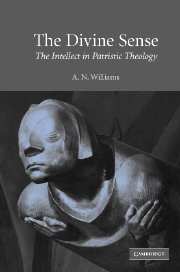Book contents
Epilogue
Published online by Cambridge University Press: 22 September 2009
Summary
The journey through the preceding centuries has shown the diversity of ways in which the intellect functions in early Christian theology. For all this variety, however, one prominent characteristic of the texts we have examined is the adhesive power of the assertion of mind: it functions as a kind of glue within the system, binding discrete components together. In light of that role, one might expect that the doctrine of God would loom larger than it has in the preceding pages, and that divine intellect would figure more prominently within it.
One question arising out of this study, then, is why the Fathers do not make more of intellect in God. Certainly, we find references throughout the period to divine wisdom, or the Logos, but lists of divine attributes, much less extended treatment of them, are neither abundant, nor does intellect invariably figure in them. Against the paucity of direct references to divine mind we must set the fact that much of what is explicitly asserted (such as divine governance or judgement) presupposes intellect. The assumption that one need not stipulate mind does not set patristic theology apart from its successors or reflect an omission attributable to the non-systematic form of its texts, moreover; in the opening questions of that most systematic of systems, the Summa theologiae, for example, Aquinas treats a series of key divine attributes and faculties, including will, but devotes not one article explicitly to divine mind.
- Type
- Chapter
- Information
- The Divine SenseThe Intellect in Patristic Theology, pp. 232 - 239Publisher: Cambridge University PressPrint publication year: 2007

